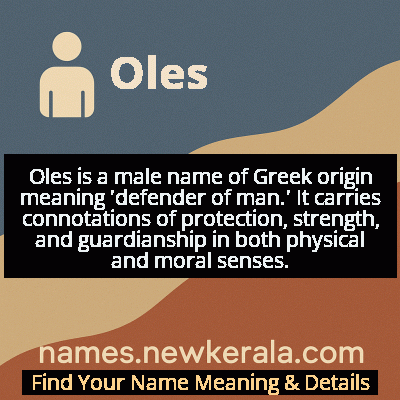Oles Name Meaning & Details
Origin, Popularity, Numerology Analysis & Name Meaning of Oles
Discover the origin, meaning, and cultural significance of the name OLES. Delve into its historical roots and explore the lasting impact it has had on communities and traditions.
Name
Oles
Gender
Male
Origin
Greek
Lucky Number
6
Meaning of the Name - Oles
Oles is a male name of Greek origin meaning 'defender of man.' It carries connotations of protection, strength, and guardianship in both physical and moral senses.
Oles - Complete Numerology Analysis
Your Numerology Number
Based on Pythagorean Numerology System
Ruling Planet
Venus
Positive Nature
Harmonious, responsible, caring, and artistic.
Negative Traits
Overly idealistic, superficial, possessive, or jealous.
Lucky Colours
Pink, turquoise.
Lucky Days
Friday.
Lucky Stones
Diamond, turquoise.
Harmony Numbers
2, 3, 9.
Best Suited Professions
Artists, musicians, teachers, healthcare workers.
What People Like About You
Warmth, nurturing nature, artistic flair.
Famous People Named Oles
Oles Honchar
Writer
Ukrainian novelist and Soviet dissident, author of 'The Cathedral'
Oles Buzina
Journalist
Ukrainian writer and television presenter known for his historical works
Oles Sanin
Film director
Ukrainian filmmaker known for 'The Guide' and 'Mamay'
Oles Berdnyk
Writer
Ukrainian science fiction writer and dissident, founder of Ukrainian Spiritual Republic
Name Variations & International Equivalents
Click on blue names to explore their detailed meanings. Gray names with will be available soon.
Cultural & Historical Significance
Extended Personality Analysis
People named Oles are typically characterized by a strong sense of responsibility and protective instincts that align with the name's meaning of 'defender of man.' They often exhibit natural leadership qualities, combining strategic thinking with emotional intelligence. Oles tend to be principled individuals who stand firmly for their beliefs, sometimes appearing stubborn but always reliable. Their protective nature extends beyond physical safety to include emotional support and guidance for friends, family, and community members. They are often perceived as pillars of strength in difficult situations, offering both practical solutions and moral support. While they can be reserved in expressing emotions, their actions consistently demonstrate deep care and commitment to others' wellbeing. This combination of strength and sensitivity makes Oles valued members of any community, often serving as unofficial guardians and advisors. Their analytical minds allow them to assess situations thoroughly before acting, making their protective interventions both thoughtful and effective.
Modern Usage & Popularity
In modern times, Oles maintains consistent popularity in Ukraine and among Ukrainian communities worldwide, though it remains relatively uncommon in global contexts. The name has experienced a cultural resurgence as part of broader movements to preserve and celebrate Ukrainian heritage. While not among the most popular names statistically, it holds significant cultural cachet and is often chosen by parents seeking names with historical depth and meaningful connotations. The name appears frequently in artistic, literary, and academic circles, reflecting its association with intellectual and creative pursuits. Outside Eastern Europe, Oles is occasionally adopted by parents of various backgrounds who appreciate its strong, protective meaning and distinctive sound. Digital globalization has increased awareness of the name, though it remains most strongly tied to its Ukrainian cultural roots. Current usage trends show steady rather than dramatic popularity, suggesting it will continue as a culturally significant choice rather than a fleeting fashion.
Symbolic & Spiritual Meanings
Symbolically, Oles represents the archetype of the protector and guardian in its fullest sense. The name embodies the concept of standing between danger and vulnerability, whether that protection is physical, moral, or cultural. Metaphorically, it suggests a person who defends truth, justice, and community values against various threats. The symbolic meaning extends to intellectual and spiritual protection—defending ideas, cultural heritage, and moral principles. Oles symbolizes the human capacity for courageous intervention and the virtue of putting others' safety before self-interest. In broader symbolic terms, the name represents the enduring need for guardians in society and the noble qualities associated with that role: vigilance, strength, responsibility, and sacrifice. It carries connotations of reliability and trustworthiness, suggesting someone who can be depended upon in times of crisis. The symbolic weight of 'defender of man' makes Oles a name associated with heroic ideals and moral fortitude across cultural contexts.

